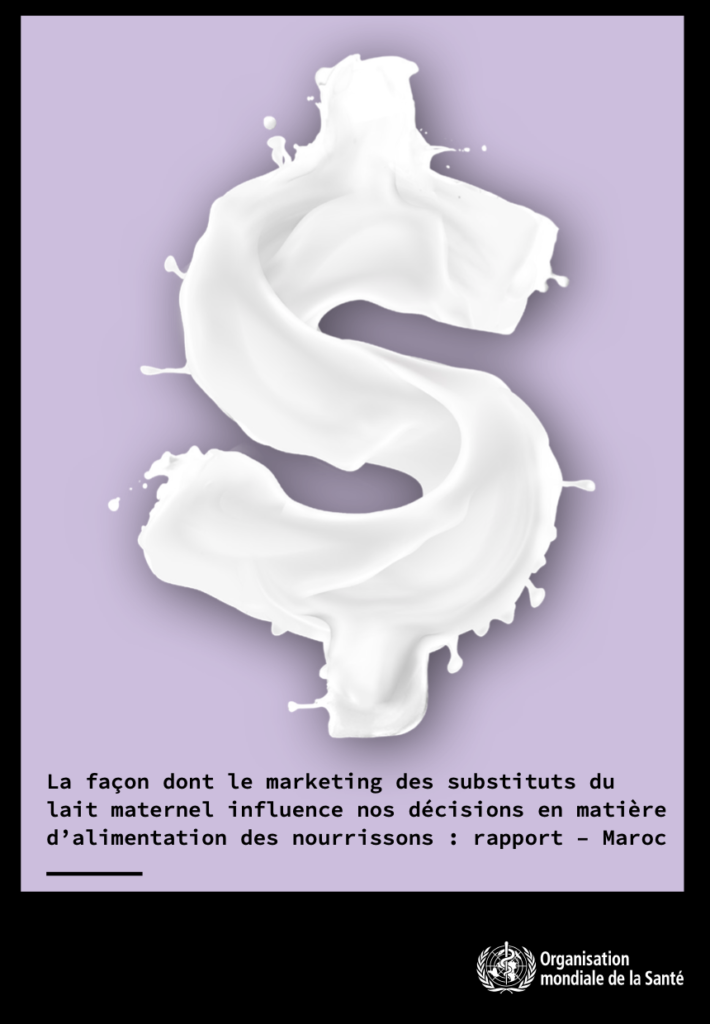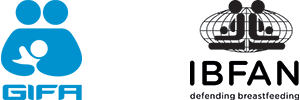“He who pays the piper calls the tune.” (British proverb) – “There is no free lunch”
10/28/2024
- Conflicts of interest in the world of health
- WHO position on marketing
- Babies before business – Conflicts of interest in health professions
- Individual conflicts of interest
- Institutional conflicts of interest
- IBFAN-GIFA’s position
- Role and responsability of health workers
- Right to Food and Nutrition WATCH
- Useful links
Conflicts of interest in the world of health
Putting the health and well-being of babies before the profits and market share expansion of multinational companies is at the heart of IBFAN-GIFA’s action. Conflicts of interest in the world of health and food – including breastfeeding – have been at the heart of GIFA’s concerns since the association was founded in 1979. We regularly stress the importance of complying with the International Code of Marketing of Breast-milk Substitutes. Here are some of the messages we have published
- WHO Status report 2022 on the national implementation of the International Code (May 12, 2022) Code-Status-Report2022-9789240048799-eng
- Abusive marketing practices by companies (2022) https://www.gifa.org/en/who-reveals-shocking-extent-of-exploitative-formula-milk-marketing/
The monumental infant formula market https://www.gifa.org/en/marketing-the-55-billion-formula-milk-industry/ (2021)
WHO position on marketing
The World Health Organisation provides information on breastfeeding and publishes reports on the marketing of infant formula. In recent years, it has strengthened its critical stance towards companies. In 2022, three relevant reports were published criticising the aggressive and abusive marketing of infant milk and infant formula manufacturers.
WHO Report 2023 on marketing in Morocco
A new report has been published in French: « La façon dont le marketing des substituts du lait maternel influence nos décisions en matière d’alimentation des nourrissons : rapport – Maroc ».

Status reports OMS, UNICEF et IBFAN
See the « Status reports » published jointly by WHO, UNICEF and IBFAN on the state of implementation of the International Code worldwide.
- Status Report 2024
- Status Report 2022
- Status Report 2020
- Status Report 2018
- Status Report 2016 et Newspost comment by GIFA ici
Babies before business – Conflicts of interest in health professions
How baby food business infiltrates the health system. Summary of the research article by Becker GE, Ching C, Nguyen TT, et al. Babies before business: protecting the integrity of health professionals from institutional conflict of interest BMJ Global Health 2022;7 https://gh.bmj.com/content/7/8/e009640
- The commercial milk formula industry’s duty to maximise profits conflicts with the health system’s duty to protect health and to support breastfeeding.
- The marketing tactics and relationships with the commercial milk formula industry including financial or material support, sponsorship of training or research and advertising in journals or at events contribute to conflicts of interest within the health system.
- Employers of health workers, academic institutions, professional associations and governments all have a duty of care to protect health systems from predatory marketing and to facilitate individual health workers to practice in an ethical manner.
- National regulatory measures to implement and ensure monitoring of compliance with the International Code of Marketing of Breast-milk Substitutes protect health workers in addition to children and their families.
Individual conflicts of interest
“An [individual] conflict of interest is a set of conditions in which professional judgment concerning a primary interest […] tends to be unduly influenced by a secondary interest […].” (D. F. Thompson)
By means of gifts and gratuities of all kinds, companies producing breast-milk substitutes and other infant foods use their considerable economic and financial power to encourage certain health professionals to recommend their products. This constitutes a major conflict of interest insofar as the health professions are vested with functional authority.
Direct impact on the health of babies and mothers
This authority is often combined with a lack of training and knowledge about breastfeeding. As a result, parents are deprived of adequate and impartial advice on the optimal feeding practices to adopt for the benefit of their child.
Such abusive commercial practices on the part of the industry lead to a lack of support or to breastfeeding being abandoned (see WHO recommendations on breastfeeding) and to the widespread use of industrial infant food products, with dramatic effects on health:
- Increased mortality and morbidity rates among children,
- an increase in the number of overweight and obese children,
- increased risk of low immunity and contracting infectious diseases
- risk of over-consumption of antibiotics
- increased incidence of non-communicable diseases in children, adolescents and women
- etc….
Institutional conflicts of interest
“Institutional conflicts of interest arise when an institution’s own financial interests or those of its senior officials pose risks of undue influence on decisions involving the institution’s primary interests.” (B. Lo and M. J. Field)
At the institutional level, multinational companies attempt to influence decision-making (national or international) through direct or indirect partnership agreements and funding. Moreover, those companies multiply their participation in multi-stakeholder initiatives (MSIs) and other public-private partnerships (PPPs) launched on an international scale.
In so doing, companies promote the creation of non-mandatory standards (such as “voluntary” codes of conduct), developed without democratic control and allowing them to unduly evade their obligations under international law. Indeed, these new strategies prevent, replace or circumvent efforts to develop legally binding regulatory tools and structures. These strategies, which have the advantage of giving companies a positive and “ethical” image at little cost, have been on the rise for the past 15 years or so, although they seem incompatible with the duty of United Nations agencies to promote the public interest through the respect, protection and fulfilment of human rights.
Bluewashing: The expression “bluewashing” refers to the practices of companies that use the United Nations blue banner to brand their activities in order to improve their social image.
Direct impact on health policy
In this way, companies promote the creation of non-mandatory standards (such as “voluntary” codes of conduct), drawn up without democratic control and enabling them to unduly evade their obligations under international law. In effect, these new strategies prevent, replace or circumvent efforts to develop legally binding regulatory tools and structures.
These strategies, which have the advantage of giving companies a positive and “ethical” image at little cost, have been on the increase over the last fifteen years, although they seem incompatible with the duty of UN agencies to promote the public interest through the respect, protection and fulfilment of human rights.
- Pachón Robles C.A., Mialon M. et al. (2023) Breastfeeding, first-food systems and corporate power: a case study on the market and political practices of the transnational baby food industry in Brazil
- News post GIFA 2023 : Lancet Breastfeeding Series 2023 https://www.gifa.org/lancet-breastfeeding-series-2023/
- Tanrikulu & Mialon (2020) : Activité politique des entreprises comme Nestlé et l’impact sur l’allaitement et les politiques de santé publique.
- Corporate Influence on the Business and Human Rights Agenda of the United Nations (June 2014) Link to source
- George Kent, Freedom from Want: The Human Right to Adequate Food, Georgetown
IBFAN-GIFA’s position
IBFAN-GIFA considers that economic and commercial interests must under no circumstances interfere with the public interest. For this reason, we are actively engaged in identifying all situations that could lead to the relegating of the public interest to a secondary position in favour of commercial interests, whether they result from the financing of individuals or institutions, such as the World Health Organization. We denounce these risky situations and propose sustainable solutions to ensure that the public interest mission of international agencies is preserved and that companies comply with their human rights obligations as prescribed by international law.
Acting on its convictions, IBFAN-GIFA also commits itself not to receive any funding, direct or indirect, from commercial companies. Furthermore, IBFAN-GIFA is a member of the Conflicts of Interest Coalition.
- IBFAN GIFA, 2018, Health governance in the public interest? Who redefines conflicts of interest and risks undermining public health mandates, Press conference at the Geneva Press Club
- IBFAN, 2016, Understanding conflicts of interest to safeguard democratic & evidence-based health and nutrition governance, annotated presentation by Judith Richter
- Right to Food WATCH, 2012 “Conflicts of Interest and Human Rights-Based Policy Making: The Case of Maternal, Infant, and Young Children’s Health and Nutrition” (pages 31-36)
- IBFAN, 2011 “Sponsorship and conflicts of interest – Position Statement“
- IBFAN, 2005 “Conflicts of Interest and Policy Implementation – Reflections from the fields of health and infant feeding“
- IBFAN-GIFA, 2003 “We the Peoples’ or ‘We the Corporations’? Critical reflections on UN-business “partnerships”
Role and responsability of health workers
Healthcare professionals – men and women – have the confidence of their patients and the families they care for. In the field of health and nutrition, the message that professionals convey through words, but also through posters in their offices and waiting rooms and through the brochures they distribute can be strategic for commercial enterprises. In most cases, these messages are ambiguous when it comes to breastfeeding. The purpose of this type of marketing is to sell a product, and the promotion of breastfeeding is a booster. And health professionals are the vehicles for this marketing.
On this topic, see the WHO page on Roles and responsibilities of Health Workers in relation to the International Code of Marketing of Breast-milk Substitutes.
Right to Food and Nutrition WATCH
The role of this observatory, which publishes in French and English (Right to Food and Nutrition WATCH), is to draw attention to conflicts of interest and collusion between governments and industry.
- Right to Food WATCH https://www.righttofoodandnutrition.org/watch
- Right to Food WATCH, 2015 (en anglais)
- Right to Food WATCH, 2012 (en français) « Conflits d’intérêts et formulation de politiques fondées sur les droits humains : le cas de la santé et de la nutrition des mères, des nourrissons et des jeunes enfants » (pages 31-36)
- Right to Food WATCH, 2012 (en anglais) « Conflicts of Interest and Human Rights-Based Policy Making: The Case of Maternal, Infant, and Young Children’s Health and Nutrition » (pages 31-36)
Useful links
- L Lake, M Kroon, D Sanders, A Goga, C Witten, R Swart, H Saloojee, C Scott, M Manyuha, T Doherty. Child health, infant formula funding and South African health professionals: Eliminating conflict of interest. 2019 SAMJ December 2019, Vol. 109, No. 12
- Granheim SI, Engelhardt K, Rundall P, Bialous S, Iellamo A, Margetts B, et al. Interference in public health policy: examples of how the baby food industry uses tobacco industry tactics. 2017 World Nutr. 2017;8(2):288–310
- Le film Tigers (2014) réalisé par Danis Tanovic et présenté pour la première fois au Festival International du Film de Toronto le 8 septembre 2014. Il raconte le vécu d’un jeune commercial pakistanais spécialisé dans l’industrie pharmaceutique travaillait pour Nestlé, jusqu’au moment où il a constaté de ses yeux avec horreur que les formules lactées commerciales pour nour- rissons dont il faisait la promotion auprès des hôpitaux et des médecins causaient des maladies et provoquaient la mort des bébés. Il a alors décidé de lutter contre l’industrie des substituts du lait maternel avec le soutien d’IBFAN (International Baby Food Action Network).
